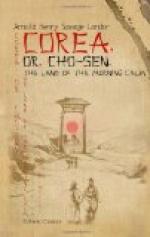It is a common occurrence in China for criminals, kneeling in a row to be executed, to crack jokes among themselves, and even at the executioner’s expense. In Corea, they cannot go quite so far as that, for things are done somewhat differently. In the latter country, the prisoners are detained in the gaols sometimes for months and even years, undergoing judgments and sentences, floggings and milder tortures innumerable, so that it is almost with a feeling of relief and gladness that, finally, being proved guilty, they receive the news of their fast approaching end. When their time is come, they are removed from prison, and dragged out into a courtyard, within which, with the first rays of light, have been brought some little carts with heavy and roughly-made wooden wheels, each drawn by a sturdy bull. On the ground some wooden crosses have been set up, and to each of these a criminal is tied with ropes, his chest and arms being bare, and cut into by the tightened cords, and only his padded trousers being left. Each cross with its human freight is then planted and made firm on a bull cart; and then, when all is ready, the ghastly procession, headed by the executioner, a few kissos (soldiers), armed with old fashioned flint locks or with spears, makes its way slowly through the streets of the town, one of the followers proclaiming aloud the crimes committed and the sentences passed on the crucified. Sleepy women and children, with uncombed hair, peep out of the paper windows, while the men hurry down to the street and join the procession in large numbers, making fun at the expense of the poor wretches, and even insulting them; while the latter, hang helpless and defenceless from their crosses, their bodies livid with cold, pain and starvation. Occasions such as these, are regular orgies for the soldiers, and those who follow the mournful cortege. Not a wine-shop on the road-side is left unvisited, and continual halts are made that wine may be freely drunk, and food swallowed, as only Corean soldiers know how to do it. Occasionally, a pious passer-by, moved to compassion, may, amid the howls of the crowd, raise his wine-cup to the lips of one of the sentenced, and help him thus to make death more merry. Once this sort of thing is started, the example is usually at once emulated by others, and, as the hours go by, a considerable amount of intoxicating stuff is consumed, not only by the executioner, soldiers and followers, but also by those to be executed. Before very long, however, the bodies of the victims thus carried become senseless and nearly frozen to death. Their heads then hang down pitifully, all blue and congested, and quivering with the jerking of the cart.
“Era! Era! Picassa!” ("Get out! get away!”) the drunken soldiers call out at intervals, as they swallow their last mouthful of rice, and order the mapus to move on to the next eating-place. Crowds of men and children collect round the miserable show and prudent fathers, pointing at the victims, show their heirs what will be the fate of those who do what is wrong. During the whole day are the poor wretches thus carted to and fro, in the streets of the town, stoppages being made at all the public eating-places, where feasting invariably takes place, though it is also almost as invariably left unpaid for.




